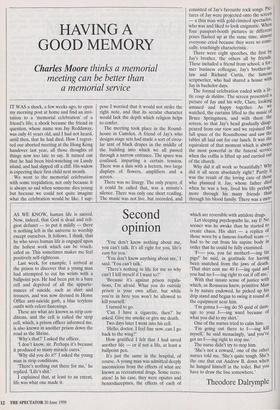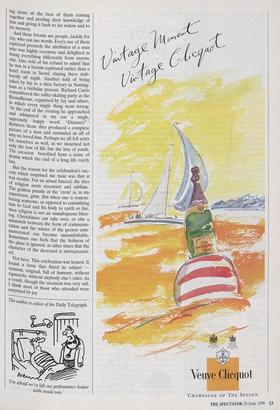HAVING A GOOD MEMORY
Charles Moore thinks a memorial
meeting can be better than a memorial service
IT WAS a shock, a few weeks ago, to open my morning post at home and find an invi- tation to a 'memorial celebration' of a friend's life; a shock because the friend in question, whose name was Jay Reddaway, was only 41 years old, and I had not heard, until then, that he had died. How I regret- ted our aborted meeting at the Hong Kong handover last year, all those thoughts of things now too late to say. It turned out that he had been bird-watching on Lundy island, and had slipped off a cliff. His widow is expecting their first child next month.
We went to the memorial celebration with some trepidation, not only because it is always so sad when someone dies young but because we could not quite imagine what the celebration would be like. I sup- pose I worried that it would not strike the right note, and that its secular character would lack the depth which religion helps to confer.
The meeting took place in the Round- house in Camden. A friend of Jay's who designs stage sets had made a sort of circu- lar tent of black drapes in the middle of the building into which we all passed through a narrow entrance. The space was confined, imparting a certain tension. There was a dais with a lectern, two large displays of flowers, amplifiers and a screen.
There was no liturgy. The only prayer, if it could be called that, was a minute's silence. There was only one short reading. The music was not live, but recorded, and consisted of Jay's favourite rock songs. Pic- tures of Jay were projected onto the screen — a thin man with gold-rimmed spectacles, who was and liked to look enigmatic. When four passport-booth pictures in different poses flashed up at the same time, almost everyone cried because they were so comi- cally, touchingly characteristic. There were eight speeches, the first by Jay's brother, the others all by friends. These included a friend from school, a for- mer business colleague, Jay's brother-in- law and Richard Curtis, the famous scriptwriter, who had shared a house with Jay in bachelor days. The formal celebration ended with a lit- tle coup de theatre. The screen presented a picture of Jay and his wife, Clare, looking amused and happy together. As we watched, the curtains lifted to the music of Bruce Springsteen, and with them the screen, so that Jay's head gradually disap- peared from our view and we rejoined the full space of the Roundhouse and saw the tables all laid out for our lunch. It was the equivalent of that moment which is always the most powerful in the funeral service when the coffin is lifted up and carried out of the church. Why did it all work so beautifully? why did it all seem absolutely right? Partly it was the result of the loving care of those who planned it. Jay, whose father died when he was a boy, lived his life perhaps more through his many friends than through his blood family. There was a mov- ing sense of the best of them coming together and pooling their knowledge of him and giving it back to his widow and to his memory. And these friends are people, luckily for Jay, who can use words. Every one of them captured precisely the attributes of a man who was highly eccentric and delighted in doing everything differently from anyone else. One told of his refusal to admit that he was in a broom cupboard rather than a hotel room in Seoul, staying there stub- bornly all night. Another told of being taken by Jay to a shoe factory in Notting- ham as a birthday present. Richard Curtis remembered the roller-skating party at the R. oundhouse, organised by Jay and others, in which every single thing went wrong: At the end of the evening he approached and whispered in my ear a single, supremely happy word: "Disaster!" ' Between them, they produced a complete picture of a man and reminded us all of why we loved him. Perhaps we all felt sorry for ourselves as well, as we mourned not only the loss of life but the loss of youth. The occasion benefited from a sense of drama which the end of a long life rarely has.
But the reason for the celebration's suc- cess which surprised me most was that it was secular. For an actual funeral, the rites of religion seem necessary and sublime. The godless parade at the `crem' is, in my experience, grim. But when one is remem- bering someone, as opposed to committing hun to God and his body to earth or fire, then religion is not an unambiguous bless- g. can take over, or else a mismatch between the form of commemo- ration and the nature of the person com- memorated can become uncomfortable. Sometimes one feels that the holiness of the place is ignored, at other times that the character of the deceased is misrepresent- ed.
Not here. This celebration was honest. It found a form that fitted its subject unusual, original, full of humour, without rigmarole, without anybody else's rules. As a result, though the occasion was very sad, I think most of those who attended were surprised by joy.
The author is editor of the Daily Telegraph.
in afraid we've left our performance league table inside you.'



























































 Previous page
Previous page